[2011] 46 VST 1 (Bom) - RS Goyal & Associates
[2011] 46 VST 1 (Bom) - RS Goyal & Associates
[2011] 46 VST 1 (Bom) - RS Goyal & Associates
Create successful ePaper yourself
Turn your PDF publications into a flip-book with our unique Google optimized e-Paper software.
VATLaws (Readable Version) - Thursday, January 10, 2013<br />
follows (page 81 in 1 GSTR):<br />
"The decision in Dharamendra Textile [2008] 18 <strong>VST</strong> 180 (SC);<br />
[2008] 306 ITR 277 (SC); [2008] 231 ELT 3 (SC) must, therefore, be<br />
understood to mean that though the application of section 11AC<br />
would depend upon the existence or otherwise of the conditions<br />
expressly stated in the section, once the section is applicable in a case<br />
the concerned authority would have no discretion in quantifying the<br />
amount and penalty must be imposed equal to the duty determined<br />
under sub-section (2) of section 11 A. That is what Dharamendra<br />
Textile [2008] 18 <strong>VST</strong> 180 (SC); [2008] 306 ITR 277 (SC); [2008] 231<br />
ELT 3 (SC) decides."<br />
In the case of State of Rajasthan v. D.P. Metals [2001] 124 STC 611 (SC);<br />
AIR 2001 SC 3076, a three-Judge Bench of the Supreme Court interpreted<br />
section 78(5) of the Rajasthan Sales Tax Act, 1994 which read as follows<br />
(page 619 in 124 STC):<br />
"The incharge of the check-post or the officer empowered under<br />
sub-section (3), after having given the person in charge of the goods a<br />
reasonable opportunity of being heard and after having held such<br />
enquiry as he may deem fit, shall impose on him for possession or<br />
movement of goods, whether seized or not, in violation of the<br />
provisions of clause (a) of sub-section (2) or for submission of false or<br />
Page No: 7<br />
forged documents or declaration, a penalty equal to the amount of<br />
five times of the tax leviable on such goods or thirty per cent of the<br />
value of such goods. . ."<br />
There, the court laid emphasis on the use of the word "shall" to hold<br />
that (pages 635 and 636 in 124 STC):<br />
". . . This provision cannot be read as to imply that the penalty of<br />
30 per cent is the maximum and lesser penalty can be levied. The<br />
Legislature thought it fit to specify a fixed rate of penalty and not give<br />
any discretion in lowering the rate of penalty. The penalty so fixed is<br />
meant to be a deterrent and we do not see anything wrong in this 1 . . ."<br />
Thus, the Supreme Court has held that where the Legislature makes its<br />
intention clear through the use of the word "shall", the provision would be<br />
mandatory with regard to the quantum of penalty imposable. A similar<br />
ratio has recently laid down by a three-judge Bench of the Supreme Court<br />
in Commissioner of Central Excise v. Sunil Silk Mills [<strong>2011</strong>] 267 ELT 438<br />
(SC), where rule 96ZQ(5) of the Central Excise Rules, 1944 was being<br />
interpreted. The penalty involved there was similarly held to be mandatory<br />
due to the use of the word "shall." 2<br />
In the present case, the State Legislature has in section 61(2) clearly<br />
conferred a discretion on the Commissioner to impose a penalty. Once that<br />
is the position, the mere use of the words "equal to one tenth per cent of<br />
the total sale" cannot lead to the conclusion that there is no discretion in<br />
regard to the quantum of the penalty and that a penalty only in an amount<br />
equal to one tenth per cent of the total sales can be imposed.<br />
Some guidance in this regard can be obtained from the judgment of the<br />
This copy was printed from VATLaws licensed to: R.S. <strong>Goyal</strong>


![[2011] 46 VST 1 (Bom) - RS Goyal & Associates](https://img.yumpu.com/38346436/6/500x640/2011-46-vst-1-bom-rs-goyal-amp-associates.jpg)
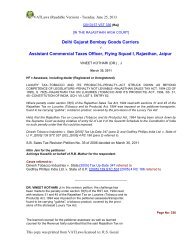
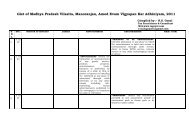
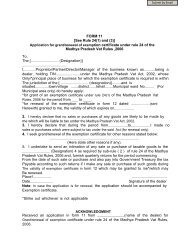
![levy of tax under vat 9b an stamp duty simultaneously[1] - RS Goyal ...](https://img.yumpu.com/45559052/1/158x260/levy-of-tax-under-vat-9b-an-stamp-duty-simultaneously1-rs-goyal-.jpg?quality=85)
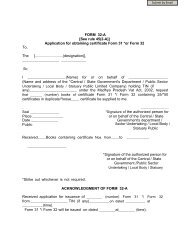
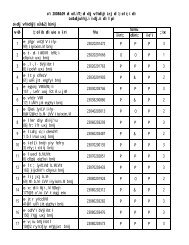
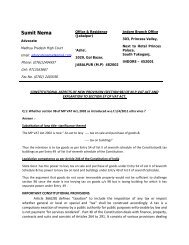
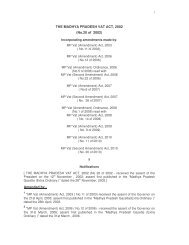
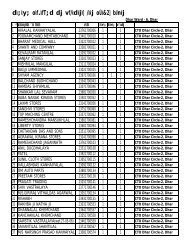
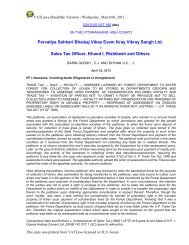
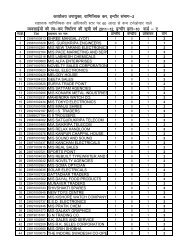
![[2012] 54 VST 26 (P and H) - RS Goyal & Associates](https://img.yumpu.com/38348208/1/190x245/2012-54-vst-26-p-and-h-rs-goyal-associates.jpg?quality=85)
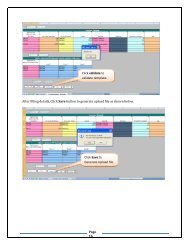
![[2012] 47 vst 116 (cestat) - RS Goyal & Associates](https://img.yumpu.com/38348091/1/190x245/2012-47-vst-116-cestat-rs-goyal-associates.jpg?quality=85)
![[2012] 47 VST 379 (Ker) - RS Goyal & Associates](https://img.yumpu.com/38348087/1/190x245/2012-47-vst-379-ker-rs-goyal-associates.jpg?quality=85)